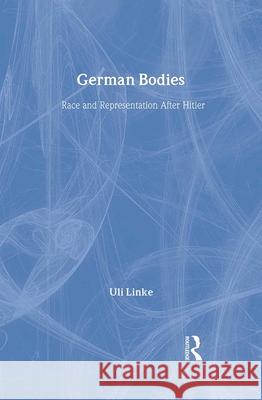German Bodies: Race and Representation After Hitler » książka
German Bodies: Race and Representation After Hitler
ISBN-13: 9780415921213 / Angielski / Twarda / 1999 / 288 str.
German Bodies: Race and Representation After Hitler
ISBN-13: 9780415921213 / Angielski / Twarda / 1999 / 288 str.
(netto: 653,03 VAT: 5%)
Najniższa cena z 30 dni: 654,86
ok. 22 dni roboczych.
Darmowa dostawa!
How did Nazism and its legacy define German identity and citizenship? Anthropologist Ulrike Linke examines the various ways German-ness has been imagined in public discourse since World War II. While the substance of the project concerns politics, issues of citizenship and democracy, and the enigmas of racism, Linke approaches her subject with an anthropologist's tools. Beginning with the Nazi eroticization of the bodily ideal, Linke moves across the 1945 threshold to explain how the new Germany organized its understanding of the body: public nudism; the revival of the cult of the body; and the attempt to de-eroticize white nakedness. Linke also examines the the feminization of the guest labourers - foreign workers needed during the reconstruction boom and then regarded as unwelcome aliens - and the ways in which today's German left and militant right converge. In the 1990s the language of otherness, of the enemy, reintroduces into everyday German culture distubingly familar images of genocide, annihilation and dismemberment.











